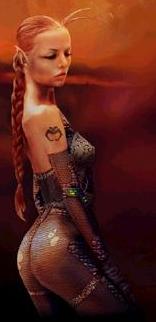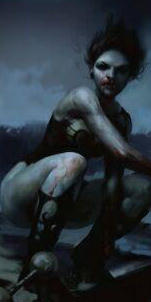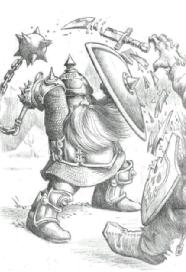Menu
Home
Deities
Morts
Clans
Race
Class
Telnet
Help
Email
Give

Races
Cent
Cyclop
Draco
Dryad
Dwarf
Elf
Fiend
Giant
Gno
Goblin
Half
Hum
Illythid
Lizard
Pixie
Shad
Troll

Menu
Home
Deities
Morts
Clans
Race
Class
Telnet
Help
Email
Give

Races
Cent
Cyclop
Draco
Dryad
Dwarf
Elf
Fiend
Giant
Gno
Goblin
Half
Hum
Illythid
Lizard
Pixie
Shad
Troll

Menu
Home
Deities
Morts
Clans
Race
Class
Telnet
Help
Email
Give
Dwarf
Race
Home
|
|
More on Dwarves

 Imbued with unchanging attitudes and steadfastness
Dwarves do not waver even in the face of great
adversity. Well suited to their lives underground
they can see in the dark and detect underground
dangers and pitfalls. Dwarf craftsmen have created
the finest cities and buildings in the world. They
have no fear of poisons and noxious substances
and shake off its effects as easily as they slay the
goblins who lurk in the dark. Dwarves are also
great warriors, well disciplined and organized into
armies that strike fear into evil monsters
everywhere. To most dwarves the world is made
up of the dark places underground. The lands
above are strange and remote. Almost certainly they
would have been formed or shaped by the gods of other lands. Most dwarves
believe that the world is made up of a number of parts created for different
peoples. Dwarves were given the deep earth as their own, Elves the forests,
Halflings the fields; each in their own place.
A sick or injured dwarf will be fed and cared for by his clan. Those in good
health are expected to work in order to maintain the welfare and reputation
of the clan. No dwarf would ever do otherwise. Someone who cheats or
doesn't pull his own weight earns the disapproval of his fellow clansmen. He
will be warned and pressure will be brought to bear to ensure that he does not
bring the name of the clan into disrepute. If he does not heed the warnings, he
will be ostracized. An ostracized dwarf loses all benefits provided by the clan.
The clan's guild will prevent him from working and confiscate his tools if it can.
If he shows a desire to mend his ways, he will be allowed back into the clan,
and the guild will lift the ban. If not, he will be left to himself and even his
family will shun him.
Imbued with unchanging attitudes and steadfastness
Dwarves do not waver even in the face of great
adversity. Well suited to their lives underground
they can see in the dark and detect underground
dangers and pitfalls. Dwarf craftsmen have created
the finest cities and buildings in the world. They
have no fear of poisons and noxious substances
and shake off its effects as easily as they slay the
goblins who lurk in the dark. Dwarves are also
great warriors, well disciplined and organized into
armies that strike fear into evil monsters
everywhere. To most dwarves the world is made
up of the dark places underground. The lands
above are strange and remote. Almost certainly they
would have been formed or shaped by the gods of other lands. Most dwarves
believe that the world is made up of a number of parts created for different
peoples. Dwarves were given the deep earth as their own, Elves the forests,
Halflings the fields; each in their own place.
A sick or injured dwarf will be fed and cared for by his clan. Those in good
health are expected to work in order to maintain the welfare and reputation
of the clan. No dwarf would ever do otherwise. Someone who cheats or
doesn't pull his own weight earns the disapproval of his fellow clansmen. He
will be warned and pressure will be brought to bear to ensure that he does not
bring the name of the clan into disrepute. If he does not heed the warnings, he
will be ostracized. An ostracized dwarf loses all benefits provided by the clan.
The clan's guild will prevent him from working and confiscate his tools if it can.
If he shows a desire to mend his ways, he will be allowed back into the clan,
and the guild will lift the ban. If not, he will be left to himself and even his
family will shun him.
Dwarves are expert craftsmen not out of some god given ability, but because
they serve long, exacting apprenticeships. Dwarves traditionally serve a 25 year
apprenticeship, which begins at the age of 25. To dwarves this is part of life.
A job worth doing, is worth doing well. This attitude is deeply ingrained and
explains why dwarves love to create beautiful objects and lavish so much time
on them. They seek to create that which will last until time's end, and they
have difficulty comprehending why other races consider work a chore rather
than an act of artistic expression to be savored and enjoyed. Dwarf craftsmen,
because of their skills, produce weapons, armor, and other goods more quickly
than other races, yet of superior quality.
Dwarves are viewed as humourless, if not downright grumpy, by other races.
This is a fair assessment. They do not often tell jokes, and have no appreciation
of practical jokes. Society is based on law, order, and a respect for one's fellows.
A dwarf does not abuse that respect by ridiculing another's dignity. Dwarves
love to work and find pleasure in it. This pleasure is so spiritually uplifting that
any attempt at humor appears facile. Those not content with work or their
position in life may need such diversion, but humour is seen as insult. That's not
to say that dwarves are humourless, they have a very black humour concerning
their racial enemies, but their sense of humour is very different from that of
humans, for example.
The Dwarven concept of wealth is different, as well. Dwarves are attracted to
objects for their intrinsic beauty, not for any commercial value. They prize fine
workmanship, but know that craftsmen only augment what the earth has
provided. Gold has the greatest significance to them, not for its value, but for its
natural beauty and pliability. In the hands of a master craftsman, gold can be
heated and poured into molds, beaten with a hammer, drawn into wires, or
carefully filigreed with a chisel. Well made golden objects are treasured for
workmanship and beauty. Poorly made objects are melted down to be remade
as coins or other objects. Dwarves are aware of the scarcity of gold, and of its
value. No dwarf has ever sold gold at less than its current value, a fact that has
led other races to see them as mean and avaricious. The dwarves' passion for
gold is well known, as is their love of gemstones. They love to possess these
treasures of the earth, polishing and cutting them into brilliant shapes that catch
the light perfectly. Each stone is seen as a shining example of the beauty of the
earth. To those who have left their underground homes, they are reminders that
true beauty comes from within the earth.
Dwarves are well aware of the value of gems. Where others value stones by
weight and scarcity, dwarves value them according to their beauty. They have,
however, no desire to own or collect pearls. As products of the sea and
shellfish, they are not considered to be gems. Dwarves find them unattractive.
Pearls lack the deep lustre of natural stones. Still, it is a foolish dwarf who does
not realize that beauty is in the eye of the beholder. While pearls are worthless,
Dwarves are aware of their trade value. Gold and gems are their greatest loves,
but other metals are important to them too. Platinum has many of the attributes
of gold and is even rarer. Silver is easy to work and holds its shape better than
gold. Its color is not as desirable, but it has its own appeal. Copper and other
metals are also considered beautiful. While other metals are more common than
gold, their comparative rarity lends them value. Iron ore is crucial to the
dwarves. With it they make weapons, armour, forges, and tools. Iron ore veins
are seen as the bones of the earth; bones bequeathed to the Dwarves to be used
for their own purposes. When forged with carbon, Dwarves transform iron into
steel that is durable and hard without being brittle.
Though they would love to work exclusively with gold and gems, Dwarves are
a practical folk. They know that iron and steel wear hard and are infinitely more
practical as tools. Therefore they work extensively in iron and steel. Dwarf
craftsmen produce some of the finest weapons, armour, and tools in any world.
These goods, because of their quality, bring higher prices that are gladly paid
for Dwarven craftsmanship. All crafts necessary to ensure the strongholds are
places of beauty are also worked.
Dwarves do not compromise when dealing with evil races, particularly when
competing with them for living space or when their welfare is threatened.
Dwarves detest Dark Elves, Orcs, Goblins, Hobgoblins, and evil Giants
eradicating them whenever found. Their hatred of evil races is as ancient as
the Dwarves themselves. Originally, wars were fought to determine who had
the right to live underground, but the conflict has spread to the surface.
In Sarmatia Dwarves have been driven from their ancient strongholds by Orcs,
Goblins or other creatures of darkness. They now bear a burning and eternal
hatred for them. Dwarves have no doubt that they are involved in a war of
massive proportions. It is known as the "War to the Death," for the Dwarves
have sworn to fight until their enemies are destroyed. And in this they have
found a willing ally in the Roman Empire.
|
|
|
|






